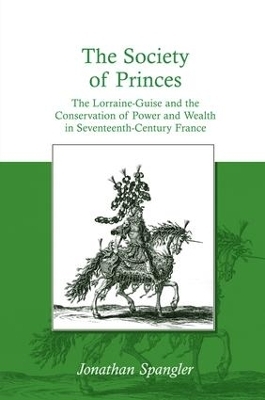
The Society of Princes
The Lorraine-Guise and the Conservation of Power and Wealth in Seventeenth-Century France
Seiten
2009
Routledge (Verlag)
978-0-7546-5860-3 (ISBN)
Routledge (Verlag)
978-0-7546-5860-3 (ISBN)
The princes etrangers, or the foreign princes, were an influential group of courtiers in early modern France, who maintained their unofficial status as 'foreigners' due to membership in sovereign ruling families. This book examines the period for the Guise at the later stages of the ancient regime.
The princes étrangers, or the foreign princes, were an influential group of courtiers in early modern France, who maintained their unofficial status as 'foreigners' due to membership in sovereign ruling families. Arguably the most influential of these were the princes of Lorraine, a sovereign state on France's eastern border. During the sixteenth century the Lorraine-Guise dominated the culture and politics of France, gaining a reputation as a powerful, manipulative family at the head of the Catholic League in the Wars of Religion and with close relationships with successive Valois monarchs and Catherine de Medici. After the traumas of 1588, however, although they faded from the narrative history of France, they nevertheless remained at the pinnacle of political culture until the end of the eighteenth century. This book examines the lesser-known period for the Guise at the later stages of the ancien régime, focusing on the recovery of lost fortunes, prestige, favour and influence that began towards the end of the reign of Louis XIII and continued through that of Louis XIV. Central to the work is the question of what it meant to be a member of a family of princely rank whose dynastic links outside the state guaranteed privileges and favours at the highest level. Jonathan Spangler investigates how an aristocratic family operated within that political culture, including facets of patronage (political, ecclesiastical, military, and the arts) and the meaning of dynasticism itself (marriages, testaments, women's roles, multiplicity of loyalties). The result is a thorough examination of the nature of crown-noble relations in the era of absolutism as seen through the example of the Lorraine-Guise. It sheds light on how the family which had so threatened the equilibrium of the late Valois monarchy became one of the strongest pillars supporting the regime of the later Bourbons.
The princes étrangers, or the foreign princes, were an influential group of courtiers in early modern France, who maintained their unofficial status as 'foreigners' due to membership in sovereign ruling families. Arguably the most influential of these were the princes of Lorraine, a sovereign state on France's eastern border. During the sixteenth century the Lorraine-Guise dominated the culture and politics of France, gaining a reputation as a powerful, manipulative family at the head of the Catholic League in the Wars of Religion and with close relationships with successive Valois monarchs and Catherine de Medici. After the traumas of 1588, however, although they faded from the narrative history of France, they nevertheless remained at the pinnacle of political culture until the end of the eighteenth century. This book examines the lesser-known period for the Guise at the later stages of the ancien régime, focusing on the recovery of lost fortunes, prestige, favour and influence that began towards the end of the reign of Louis XIII and continued through that of Louis XIV. Central to the work is the question of what it meant to be a member of a family of princely rank whose dynastic links outside the state guaranteed privileges and favours at the highest level. Jonathan Spangler investigates how an aristocratic family operated within that political culture, including facets of patronage (political, ecclesiastical, military, and the arts) and the meaning of dynasticism itself (marriages, testaments, women's roles, multiplicity of loyalties). The result is a thorough examination of the nature of crown-noble relations in the era of absolutism as seen through the example of the Lorraine-Guise. It sheds light on how the family which had so threatened the equilibrium of the late Valois monarchy became one of the strongest pillars supporting the regime of the later Bourbons.
Jonathan Spangler is Lecturer in History in the Department of History and Economic History at the Manchester Metropolitan University, UK.
Contents: Introduction; Introducing the foreign princes; The Lorraine-Guise dynastic identity: history, image, property and display; At court: Lorraines and royal favour; The corporate merger: marriage alliances, contracts and widowhood; Lorraines in the courts: successions and the French judiciary; Being everywhere ... in the South: provincial interests in the Vivarais; Lorraines on the borders and in the service of foreign monarchs; Conclusion; Appendices; Bibliography; Index.
| Erscheint lt. Verlag | 28.3.2009 |
|---|---|
| Verlagsort | London |
| Sprache | englisch |
| Maße | 156 x 234 mm |
| Gewicht | 453 g |
| Themenwelt | Geschichte ► Allgemeine Geschichte ► Neuzeit (bis 1918) |
| Geisteswissenschaften ► Geschichte ► Regional- / Ländergeschichte | |
| ISBN-10 | 0-7546-5860-0 / 0754658600 |
| ISBN-13 | 978-0-7546-5860-3 / 9780754658603 |
| Zustand | Neuware |
| Informationen gemäß Produktsicherheitsverordnung (GPSR) | |
| Haben Sie eine Frage zum Produkt? |
Mehr entdecken
aus dem Bereich
aus dem Bereich
Giordano Bruno - ein ketzerisches Leben
Buch | Hardcover (2024)
C.H.Beck (Verlag)
29,90 €
das dramatische 16. Jahrhundert
Buch | Hardcover (2024)
Rowohlt Berlin (Verlag)
34,00 €
Kunst und Gesellschaft an der Schwelle zur globalen Welt
Buch | Hardcover (2024)
Klett-Cotta (Verlag)
42,00 €


